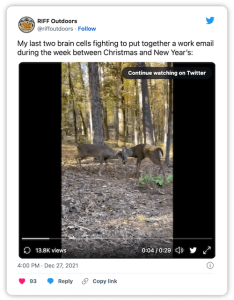Nearly all social media platforms are trying to get us to share as much as possible, using new features, filters, and monetisation tools to get us to hit that post button. However, conversations surrounding the pitfalls of social media platforms, such as privacy issues and data collection, have led us to think about how we actually use social media platforms and what we share. We are starting to see people think about what they post with more care. We are also seeing people desire private spaces, where they can share with a small audience in more secure networks, rather than publishing content for public consumption.
Social media platforms have exploded over the past year, with 3.6 billion social media users worldwide in 2020. Consumers have become more reliant than ever on digital platforms for entertainment, information, and social connection. However, whilst we are seeing people increasingly use social media, we are also seeing people look for more genuine interactions online.
What led you to create Kin – what was your core motivation?
Governments are also waking up to the importance of privacy. In Australia, social media giants will now face fines of up to m for serious privacy breaches, under reforms proposed by the Australian government. The reforms would also require platforms to verify users’ ages, get parental consent for children and cease disclosing personal information, if requested. We are now finally seeing governments, businesses and consumers waking up to the importance of privacy online. In turn, we are now seeing the evolution of social media, which in my eyes, is long overdue.
I know other parents that have done this, but it felt so clunky to me. I wanted my son, and other children to be able to enjoy these memories without needing to put in loads of effort in and wade through countless emails. I ended up calling my co-founder Matt Blom, saying: ‘There needs to be a better way of sending future messages to loved ones”. We discussed if there was an app out there that allowed for intergenerational interactions – past, present, and perhaps future – with no ads, that’s totally private and safe. There wasn’t at the time, but now there is, because we founded it. That’s how Kin was born, with the Future Messaging feature at its core.
Kin had a pre-launch valuation of $25m. Is there a certain amount of pressure that comes with this so early on?
We built Kin with privacy as top priority, which is why we have a subscription model. This business model enables us to ensure that we will never sell or exploit user data, your data belongs to you – it doesn’t belong to us. If you cancel your Kin account we send you everything back in a file. Once you post an image on major social media platforms such as Facebook and Instagram, you have very little control – you no longer own the rights to that image. At Kin we ensure everything you own is truly yours and this is only possible with a subscription based model.
What are both some of the benefits and disadvantages of Kin’s subscription model – and how do you plan to drive retention?
Traditional social media model relies on advertising, which in turn relies on engagement and data to make revenue. However, in recent years, this has proven problematic, as social media companies have done little to prevent ads from appearing alongside hate speech, fake news and other harmful content. The subscription-based business model means we will never sell our users’ data to generate revenue so we can ensure our platform stays free from harmful content online. There is also consumer appetite for subscription models where there is a genuine value add. Earlier this year, for example, Twitter introduced a subscription service, Twitter Blue, where users get access to exclusive features.
The idea for Kin came after I read a poem ‘A Little Fellow That Follows You’ by Rev. Claude Wisdom White. This poem really struck a chord with me, and I really wanted to share the poem with my son. However, as he was just a toddler at the time, I decided to set up an email account for him and send him the poem to open in the future. This quickly snowballed into regular emails for him to open in the future, including milestones and general memories I wanted to share with him.
As people continue to educate themselves on the topic of privacy, they’re looking for ways to enjoy the benefits that a digital world offers, while protecting their online footprint. Privacy online is of increasing importance, therefore it’s not surprising that we are seeing people increasingly willing to pay for the assurance of privacy. Whilst consumers used to be fine with sharing personal data with brands in order to see more personalised content, this is no longer the case. One study on US consumers found that 42% of US consumers are willing to pay per month for complete privacy on a social media network, and as much as 50% of US consumers are willing to pay per month for a fully private social media network.
Measures are being implemented to protect the privacy of users. How do you think this will impact the future for brands, advertisers, and consumers? Will people be willing to pay for privacy?
Michael Collett is the co-founder and CEO of Kin – a new private social networking app designed for families. We caught up with Michael to discuss the motivation behind Kin, the importance of privacy, and his thoughts on how social media will evolve in future.
Businesses who don’t value privacy are also seeing the backlash. Recently Snapchat’s shares plunged after it said Apple’s privacy changes hurt its ad business. Whatsapp also lost millions of users earlier this year following its privacy policy update, perfectly highlighting this change in consumer attitude.
When launching a business, the pressure is always on, no matter the pre-launch valuation. All entrepreneurs want their business to succeed. However, having the significant backing we have has allowed us to create a brilliant product experience. Much of our investment is being used to develop the app and quickly add new and better features with every version. Kin is a place where people share the stuff that matters, so getting the in-app experience right is so important to us. Our investors and our team fully believe in what we’re trying to build – we have to balance the pressure we put on ourselves, as much as anything, to succeed.
How do you predict social media will evolve in the next few years?
It’s also important to mention, Kin is so much more than the future messaging feature, so the pay off for the subscription model isn’t just in the future. Whilst future messaging is a core feature of our platform, families can interact with each other in real time. On Kin you can post memories, images, videos and messages and tag the relevant family members in your storyline, which automatically preserves photos and memories in chronological order. We have also recently launched an advanced search feature where users can look for a specific date, type of content or person to look back on and easily access content. Other Kin features include Young Persons Account, where our more junior members can get to grips with social media in a safe place, and Memorial Accounts, where families can share messages, images and videos about family members or friends who have passed away.



